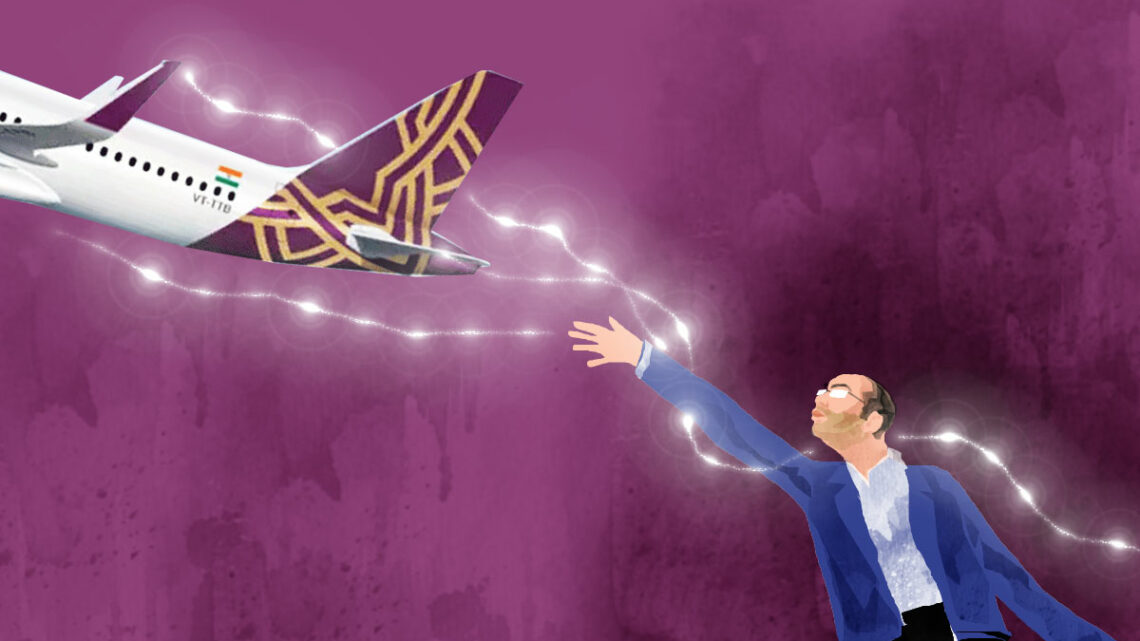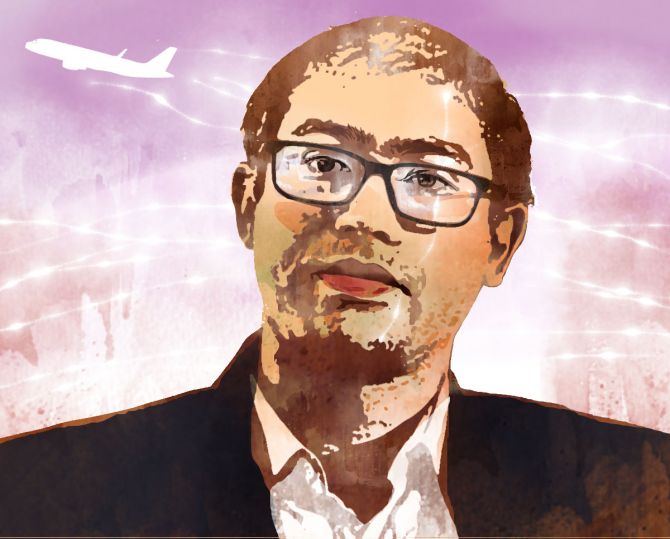
‘There is space for a brand like Vistara’
August 17, 2022‘I am seven months into the job, but it feels like seven years.’
There must be a restaurant that Vinod Kannan likes. Maybe so.
But lunch with the chief executive officer of Vistara will be a Vistara lunch.
I don’t complain as the airline is known for its in-flight culinary experience.
I am at the TajSATS flight kitchen near the Indira Gandhi international airport, Delhi.
The 24×7 kitchen serves over 40 airlines, and from Day 1 has been preparing Vistara’s in-flight food.
Kannan and other Vistara C-suite executives are a regular here for meal-tasting as the airline changes its menu regularly to give its frequent flyers a different experience.
Vistara is not the same airline it was when Kannan was deputed to India in 2019. It now has a 50-plus fleet – up from 32 just three years ago.
His presence in the Vistara kitchen begs the question: To what extent is he involved in the minute details of the airline?
“(It) may not be tasting the food but everything that faces the customer I discuss with my team at least once a week,” he says.
“We discuss punctuality, customer feedback and if there is any significant change to customer service, it passes through me.”
Kannan makes it a point to visit the airport every two weeks to meet the frontline staff, and since travel became normal has been frequently taking a Vistara flight to the airline’s 33 domestic stations.
Like his predecessors at the Vistara corner room, Kannan is a Singapore Airlines (SIA) lifer, which he joined after completing his master’s from the National University of Singapore (NUS)-MIT Alliance.
An airline job was always one of his first priorities due to his love for travel, says Kannan, who joined SIA in August 2001.
A month later two aircraft hit the World Trade Center, unleashing one of the most turbulent periods for the global aviation industry.
Did he rethink his career choice?
“Not for a moment,” pat comes the answer.
“I was very clear that I was working for the best airline in the world and I wanted to stay here.”
The first course arrives: Chhole Kulche and a sumptuous omelette from the airline’s breakfast menu.
We decide to take a small portion of each so that we can sample the entire course that the staff at TajSATS, under Chef Arun Batra, has prepared.
The chhole taste salty. Kannan explains the salt is intentionally kept a tad high: “Due to air pressure, the taste buds react a bit differently when you are up in the air. So you may find the food saltier on the ground but it tastes fine on-board.”
We go back to his career trajectory as an airline leader.
Singapore Airlines rotates its future leaders through multiple roles, and the job took him across the world: Kolkata, West Asia, Italy, Indonesia and back to Singapore where he served as chief commercial officer for SIA’s subsidiary, Scoot, before being deputed to India as Vistara’s chief strategy officer.
Kannan climbed the ranks fast, enjoying the confidence of the board of both Tata Sons and Singapore Airlines.
So, when former CEO Leslie Thng’s term ended, the industry was in little doubt that Kannan would succeed him.
I ask him how commanding an airline in India is different from that in other parts of the world.
“I am seven months into the job, but it feels like seven years,” he says, adding that he has never seen price sensitivity like here.
Due to the dominance of low-cost carriers, price is what matters to the passenger, he says before pointing out that because of the enhanced service standards provided by his airline, there is a growing base of consumers who can spot value and pay a premium for it.
India, he says, also demands a lot of personal bonding to get work done.
“In other countries there will be a set of rules; there is no scope for debate and discussion, but here there is scope for interpersonal relations to get the work done.”
The culture part is important as Vistara insiders have often blamed top SIA appointees of developing an aura of exclusivity around themselves and failing to mingle with Indian colleagues.
While Tata Sons owns 51 per cent stake in the company, the CEO is appointed by SIA.
Kannan though is different, his colleagues say.
“It’s like a breath of fresh air. He is well-versed in Hindi, local culture and people management skills,” a Vistara official says.
“It will be wrong to say I have mastered the art of working in India. I am still learning,” says Kannan, who grew up in Bengaluru.
Vistara is today a rare airline that hasn’t faced labour issues when other airlines are grappling with employee strikes over pay cuts.
“We didn’t terminate any staff and also kept the lowest level of employees insulated from pay cuts,” he says.
“We have been able to reinstate salaries to pre-Covid levels and have been able to ensure our staff are paid fairly.”
The second course arrives. There is a North Indian option of parantha and dal and a South Indian platter of idli, dosai and sambar.
We both opt for parantha and dal with Kannan reminding me that he wants my feedback about the food.
Vistara will soon launch vegan meals for its patrons, along with healthier options for the calorie-conscious flyer.
“We want to respond to every feedback and suggestion that we receive from our flyers, and veganism has been a popular demand,” Kannan says.
Continuously increasing meal choices for customers is not easy for an airline in India where people shift between being vegetarian and non-vegetarian based on the day of the week.
In its drive to become the first choice for flyers, Vistara has done multiple course corrections, like deploying aircraft in an all-economy configuration for smaller cities.
Covid has, like for all others, made things tougher for the airline, which is yet to break even in its seventh year.
Vistara faced backlash from its loyal customer base that it was trying to cut costs by degrading service standards. It has since revamped its services.
Has Covid changed Kannan as an aviation leader?
After all, running an airline is not a work-from-home job.
“(During) the last few hours of May 23 (2020), before everything was grounded, the entire management was on phone trying to ensure we bring our crew and aircraft back to the base. We had one last departure 10-15 minutes before midnight. I can never forget that night,” Kannan says.
He believes in working from the office, since it is a more effective way.
Besides, working from home isn’t healthy for family relationships, especially for people with kids, he adds.
“The first thing my wife told me when the office opened up was to go back,” Kannan, a father of two, says with a laugh, adding that the lockdown often made him impatient as there was little demarcation between home and work.
Two months later, when the time to restart came, it was equally complex with no historical data on passenger numbers and a shortage of manpower (many had quit to take up jobs in different industries).
“But I think we have established the service standards and people are now gravitating towards the Vistara brand,” he says, pointing out that from six per cent in pre-Covid times, the airline’s market share has now inched up to nine.
Dessert arrives. There are cakes and pastries. Kannan, a light eater, is full but takes a spoon of walnut cake.
With promoter Tata Sons consolidating its aviation business after the acquisition of Air India, it’s not exactly an easy time to be Vistara’s CEO.
Kannan’s colleagues are naturally anxious about their future.
Kannan would rather pass the question about where the future of Vistara lies.
“That is not something over which I or any of the 5,000 Vistara employees have control. I believe there is space for a brand like Vistara,” he says.
For now, the 42-year-old CEO, who is an avid tennis player, would like the good rally to continue.
Feature Presentation: Aslam Hunani/Rediff.com
Source: Read Full Article



